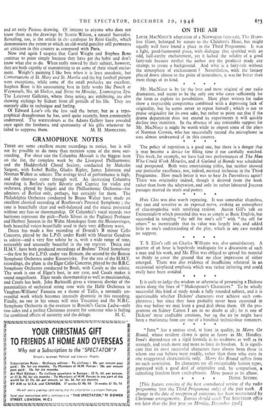ON THE AIR
Louts MACNIECE'S adaptation of a Norwegian fairy-tale, The Heart- less Giant, belonged by nature to the Children's Hour, but might equally well have found a place in the Third Programme. It was a light, good-humoured piece, with dialogue that sparkled with an odd, half-earthy enchantment, yet it lacked the solidity of a good fairy-tale because neither the author nor the producer made any attempt to create a background. And what is a fairy-tale without the atmosphere of enchantment ? Nevertheless, with the fantasy played down almost to the point of naturalness, it was far better than most things of its kind.
* *
Mr. MacNiece is by far the best and most original of our radio dramatists, and seems to be the only one who cares sufficiently for the form to explore its possibilities. Most plays written for radio show a respectable competence combined with a depressing lack of originality, but he seems never to repeat himself ; which is not to praise originality for its own sake, but rather to point out that if the drama department dors not extend its experiments it will quickly decline into inanition. In the absence of any noticeable support for Mr. MacNiece it might be worth while to import some of the plays of Norman Corwin, who has successfully turned the microphone to
uses almost undreamed of in this country.• * The policy of repetition is a good one, but there is a danger that it may become a device for filling time if not carefully watched. This week, for example, we have had two performances of The Man Who Could Work Miracles, and A Garland of Beards was scheduled and postponed. Both were entertaining trifles, but neither showed any particular excellence, nor, indeed, merited inclusion in the Third Programme. How much better it was to hear In Parenthesis again! There was originality indeed, though it derived from the book rather than from the adaptation, and only its rather laboured Joycean passages marred its truth and poetry.
* * * *
Hues Clos was also worth repeating. It was somewhat shapeless, but taut and sensitive as an exposed nerve, evoking an atmosphere of claustrophobia with terrifying realism. Austin Gill's talk on Existentialism which preceded this was as simple as Basic English, but succeeded in tangling " the self for one's self " with " the self for others " so inextricably that its value was largely lost, and added little to one's understanding of the play, which in any case needed no support.
* * * *
T. S. Eliot's talk on Charles Williams was also unsatisfactory. A quarter of an hour is hopelessly inadequate for a discussion of such a man and his work, and Mr. Eliot was obliged to spread his material so thinly to cover the ground that no clear impression of either emerged. There was also evidence of insufficient rehearsal in an occasional misplaced emphasis which was rather irritating and could easily have been avoided.
* * * * It is early to judge the wisdom or otherwise of presenting a Dickens series along the lines of " Shakespeare's Characters." To be wholly successful this kind of study needs a fully rounded subject, and it is questionable whether Dickens' characters ever achieve such com- pleteness ; but since they have probably never been examined in this way before we may learn a good deal about them. Of the pro- gramme on Sidney Carton I am in no doubt at all ; he is one of Dickens' most creditable creations, but on the air he might have been a marionette from any one of a hundred technicolour romances.
* * *
" Itma " has a serious rival, at least in quality, in Merry Go Round, whose resident clown is quite as funny as Mr. Handley. Itma's dependence on a rigid formula is its weakness as well as its strength, and tends more and more to limit its freedom. It is signifi- cant that its most successful characters have always been those in whom one can believe most readily, rather than those who exist in one exaggerated characteristic only. Merry Go Round suffers from no such restriction. Its characters are all recognisable human types, portrayed with a good deal of originality and, by comparison, a refreshing freedom from catch-phrases. More power to its elbow.
[This feature consists of the best contributed review of the radio programme (not the Third Programme only) of the past week. A change in the date of reception of criticisms has bcen necessitated by Christmas arrangements. Entries should reach TILE SPECTATOR office not later than the first post on Monday, December 23rd.]


































 Previous page
Previous page